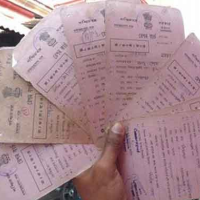800,000 Ration Cards in Bihar are Fake
 A man displays ration cards in Madhya Pradesh (file photo: PTI)
A man displays ration cards in Madhya Pradesh (file photo: PTI)
It is a poorly kept secret that India’s massive food distribution system (PDS) is riddled with inefficiency and corruption, but the scale of the problem continues to surprise. The state administration in Bihar has now discovered almost 800,000 fake ration cards that could have cost the exchequer Rs. 3.23 crore ($538,000) every month.
The Food and Consumer Protection department of Bihar reportedly found 777,000 ration cards to be fake after these were not collected for several months. These cards were detected during an internal review and inspection of the department.
All district magistrates have been asked to cancel these cards and find out how these were issued in the first place. It is suspected that local PDS dealers may have been involved in the scam, with the intention of collecting subsidized food grain and kerosene oil and selling these at the market rate.
Food and Consumer Protection Minister Shyam Rajak told the Indian Express that “east Champaran alone had over one lakh fake cards, followed by 92,478 in Samastipur, 50,575 in Madhubani and 59,472 in Muzaffarpur”. He promised that his department would investigate to identify the people responsible.
If these fake cards had been distributed it would have resulted in 2 million litres of kerosene oil and 55,550 quintals of wheat and rice reaching the black market every month, said the minister.
Bihar has 13.5 million holders of ration cards, with new ration cards being made after the Food Security Act came into effect last year. Under this landmark program, the government will provide subsidized wheat and rice to 67 percent of the country’s population.
The state-run Food Corporation of India (FCI) is expected to distribute this grain through its nationwide network of 505,000 ‘fair price shops’ or PDS centres.
Beneficiaries will get a total of five kilograms of cheap rice, wheat and coarse grains a month at subsidized prices ranging from Rs. 1 to 3 (approximately 3 U.S. cents) a kilogram. Since this is far cheaper than the market rates of Rs. 20 to 25 (around 40 U.S. cents), traders getting this grain illegally from the ‘fair price shops’ could make a huge profit. And that is where a ration card comes in handy, as the subsidized grain is provided against this document.
To combat corruption in the PDS, neighbouring Madhya Pradesh is planning to issue electronic ration cards and monitor distribution centres through CCTV.
Food and Civil Supplies Minister Kunwar Vijay Shah assured PTI that the state government would soon put in place a stringent surveillance management system to check corruption.
To Learn More:
7.77 lakh fake ration cards uncovered in Bihar, govt orders probe (by Santosh Singh, The Indian Express)
Madhya Pradesh government to check corruption in ration cards (PTI)
How Bad, Really, Is India's New Food Security Bill? (by Megha Bahree, Forbes India)
Fact Sheet: India’s Food Security Bill (by Preetika Rana, WSJ)
India's immense 'food theft' scandal (by Geeta Pandey BBC News)
- Top Stories
- Controversies
- Where is the Money Going?
- India and the World
- Appointments and Resignations
- Unusual News
- Latest News
- India College Chain’s Expansion into U.S. Draws Opposition from Massachusetts Officials over Quality of Education
- Milk Shortages in India Tied to Release of New Movies Featuring Nation’s Favorite Stars
- Confusion Swirls around Kashmir Newspaper Ban in Wake of Violent Street Protests
- Polio-Free for 5 Years, India Launches Vaccine Drive after Polio Strain Discovery
- New Aviation Policy Could Increase Service, Lower Ticket Prices






Comments